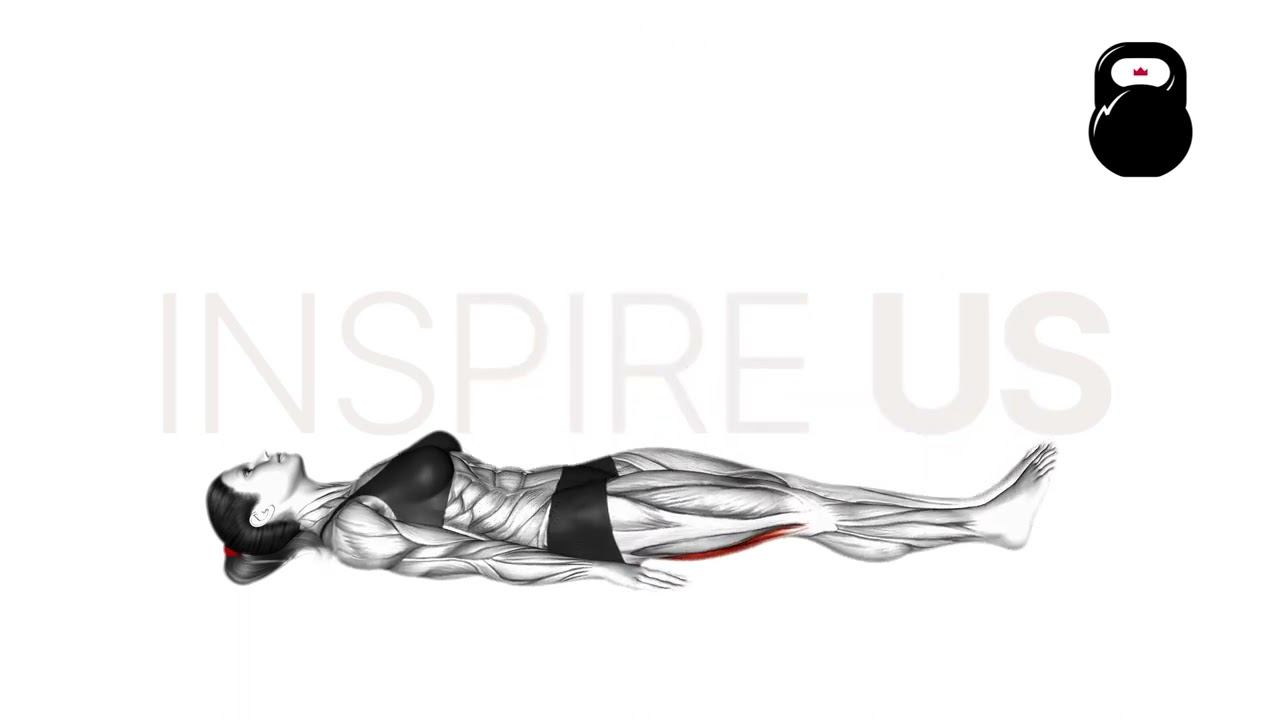Supine Hamstring Stretch: Benefits, Muscles Targeted, and More
A highly versatile mobility exercise meant to target the muscles of the lower posterior chain; the supine hamstring stretch is an invaluable inclusion into any static stretching routine.
In essence, the supine hamstring stretch involves the lifter lying on their back with one leg extended upwards. Either one hand or a band wrapped around the thigh may then be used to pull the leg further towards the torso - stretching the hamstrings and glutes.
Despite its simplicity, we advise reading through this article prior to performing the supine hamstring stretch. Not only will we cover how to perform the stretch safely, but its benefits, mistakes to avoid and a few potential alternatives will be brought up as well.
What is the Supine Hamstring Stretch?
The supine hamstring stretch is a static passive stretch involving flexion of the leg at the hip joint, knee joint extended.
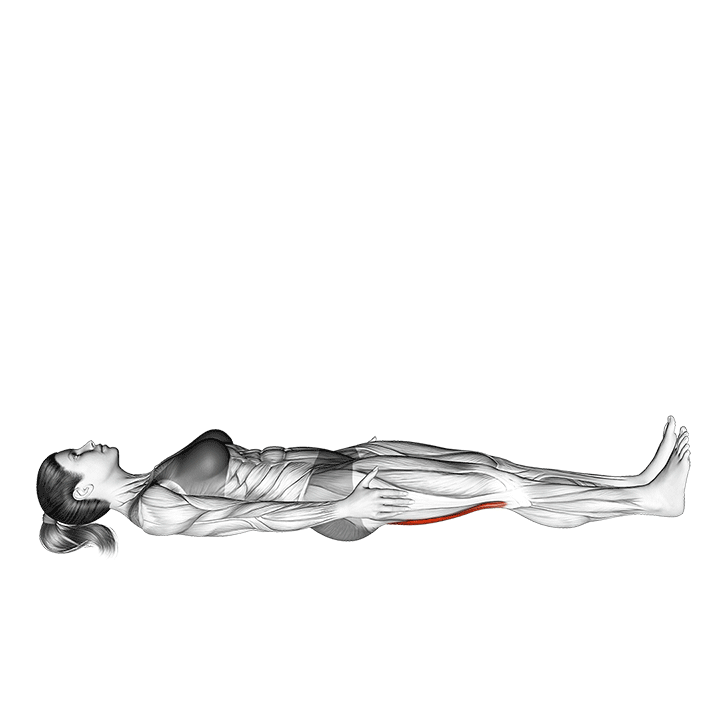
It is performed for a wide variety of functional purposes and by individuals of widely different needs - be it as a cool-off after physical training or to counteract the degenerative effects of aging and a sedentary lifestyle.
Although not required, individuals who wish to maximize their comfort during the stretch should make use of a towel or resistance band to aid in pulling the leg into a state of flexion.
Who Should Avoid the Supine Hamstring Stretch?
Although the supine hamstring stretch is quite simplistic and unlikely to result in injury, those with a history of issues relating to their hamstrings, knee joint or hip joint should first speak to a physician.
How to Do a Supine Hamstring Stretch
Performing a supine hamstring stretch is quite easy. To do so, the exerciser begins by lying flat on their back, knees drawn up and soles flat on the floor. The navel should be lightly pulled towards the spine, pressing the lower back flat against the floor.
Then, extending one leg at the knee and raising it upwards, the exerciser will either grip the thigh of the extended leg with their hands or loop a band around it. If following the latter technique, take advantage by keeping the upper back flat against the floor as well.
With the thigh now secured and the leg extended upwards, the exerciser maximizes the length of their hamstrings by pulling their leg towards their chest until a stretching sensation is felt along the back of the thigh.
Hold for up to 30 seconds. Don’t forget to switch to the opposite leg as well.
Less flexible performers may find that they have difficulty keeping the knee completely extended. This is entirely fine, so long as it is not to an excessive degree.
What Muscles and Joints are Targeted by the Supine Hamstring Stretch?
The supine hamstring stretch targets the hamstring muscles - particularly the semitendinosus, the semimembranosus and the biceps femoris. To a lesser extent, the lower section of the gluteal muscles will be stretched as well.

The more tilted the pelvis, the flatter the lower back and the greater the angle of flexion, the more the glutes will be stretched alongside the hamstrings.
In terms of joints, it is solely the femur-hip conjoinment that is utilized during the stretch. The sacrotuberous ligament and the tendons that connect to the tibia and fibula at the lower ends of the biceps femoris/semitendinosus are also stretched as well.
What are the Benefits of Doing the Supine Hamstring Stretch?
The supine hamstring stretch is performed so as to achieve the following benefits.
Excellent for Improving Lower Posterior Chain Flexibility
The main benefit to doing the supine hamstring stretch is its capacity to passively improve flexibility in the hamstrings and glutes.
Poor flexibility in these muscles can affect gait, the capacity to extend the hips and lead to generally poor athletic capability due to a lack of lower body power.
Most often, individuals with poor flexibility of the hamstrings and glutes live a sedentary lifestyle where they remain in a seated or lying position for extended periods. The supine hamstring stretch allows them to slowly counteract the effects of this lifestyle in a safe manner - all in the comfort of their own bed or couch.
Functions Well as a Cool-Off Exercise
Because the supine hamstring stretch is static, passive and lengthens the hamstrings to a relatively large range, it can function perfectly as a part of a cool-off routine.
Including the supine hamstring stretch into your cool-off will boost recovery, reduce the incidence of soreness and stimulate blood flow to the muscles.
Accessible, Zero-Impact and Low Risk of Injury
The supine hamstring stretch is so widely practiced in both medical and athletic settings because of its simplicity. It requires no advanced exercise knowledge or pre-established mobility, and can be performed entirely within a lying position.
Can be Modified to Meet Performer’s Capabilities
Much like using a band or the exerciser’s hands, the supine hamstring stretch can also be modified to meet the needs of less flexible individuals. To do so, a pillow can be placed beneath the lower back, or the leg can be pulled to a lesser degree of hip flexion so as to avoid overly straining the tissues.
Common Supine Hamstring Stretch Mistakes
Although the supine hamstring stretch is quite safe, avoid the following mistakes in order to make the most out of its benefits.
Forcing the Knee to Extend
If you can fully extend your knee while performing the stretch - then that’s excellent. However, those who cannot due to poor flexibility or a sensitive knee do not need to necessarily do the same.
It is entirely fine to perform the stretch with a small bend in the knee. So long as the foot remains pointed upwards, it is unlikely that any issues will arise from doing so.
Pulling From the Shin or Ankle
More common with the use of a towel or band - performing the supine hamstring stretch with the force being placed at the shin can place pressure on the knee joint and is less effective at stretching the hamstrings themselves.
Aim to pull your leg further towards the chest from around mid-thigh.
Arching the Lower Back
As much as possible, the lower back should be flat against the floor in order to maximize how far the hamstrings are stretched at the pelvis. Allowing them to arch will reduce the angle between the base of the pelvis and the remaining section of the hamstrings.
Alternatives to the Supine Hamstring Stretch
The supine hamstring stretch is not unique in its benefits - the following alternatives can recreate much the same effect despite being in different positions.
Seated Hamstring Stretch
The seated hamstring stretch targets the hamstrings in a similar manner to its supine cousin, only with the performer seated with one leg extended forwards.
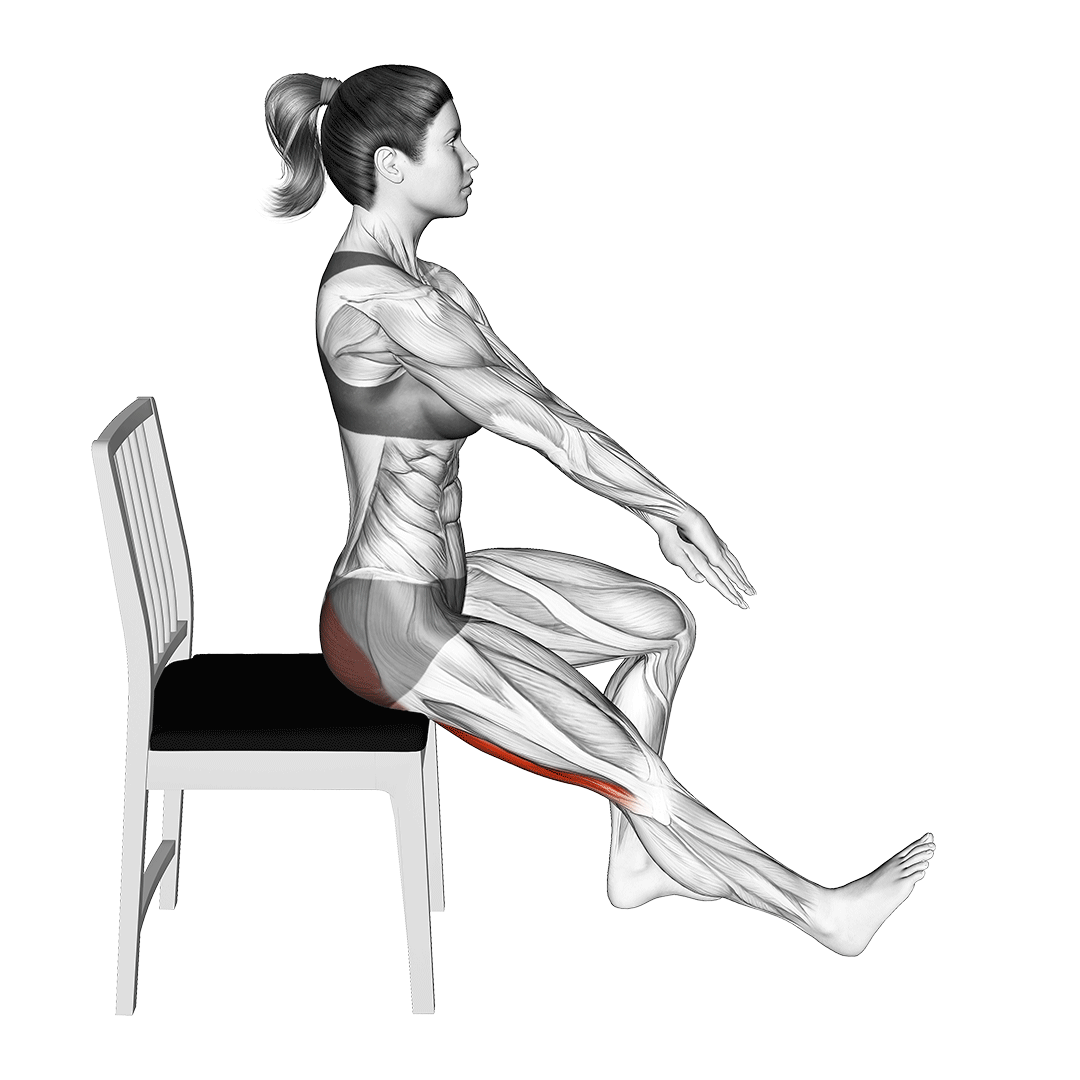
This allows the hamstrings to be actively stretched in a considerably more convenient position.
Standing Hamstring Stretch
The standing hamstring stretch functions as an alternative in much the same way as the seated hamstring stretch - that being a more active and convenient substitute to the supine variation.
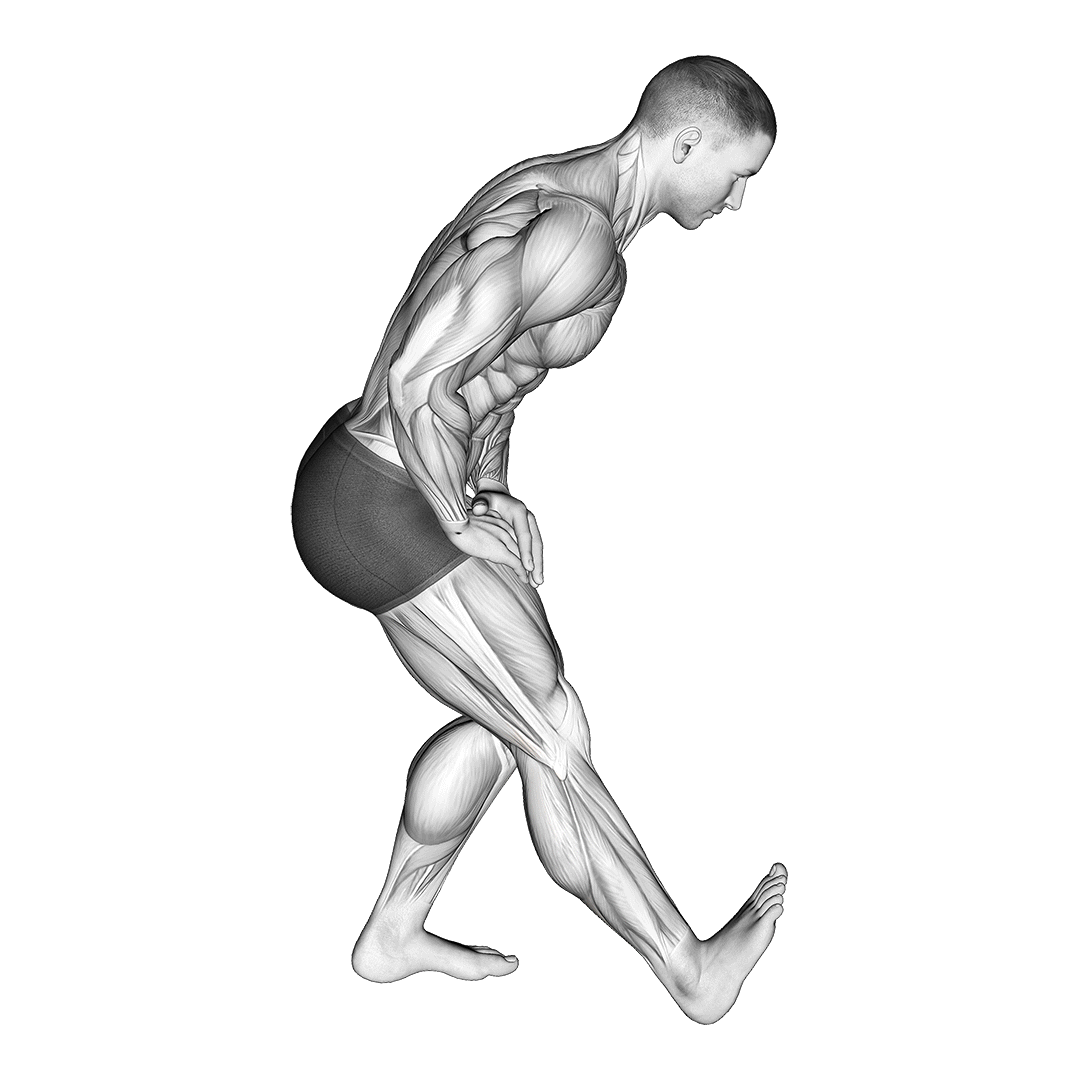
Wall Lying Hamstring Stretch
The wall lying hamstring stretch can be considered a more intense version of the supine hamstring stretch, as it replicates the same movement pattern and benefits but with the leg set against a wall.
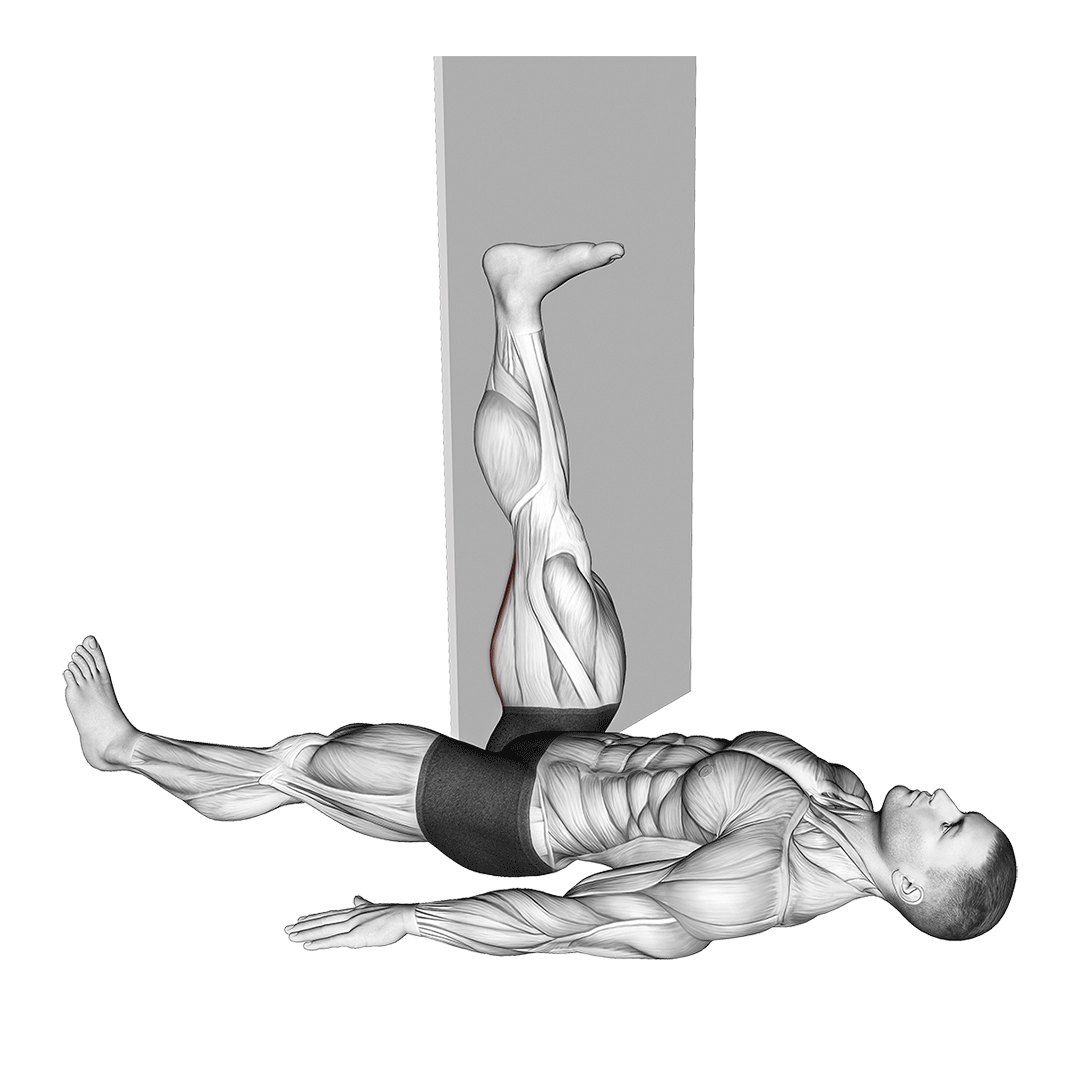
This reduces the stability demands of the movement and allows the leg to be held in place for an extended period, if needed.
Frequently Asked Questions (FAQ)
What is the Purpose of the Supine Hamstring Stretch?
The supine hamstring stretch is performed so as to improve flexibility of the hamstrings and glutes. It does so in a safe, effective and simplistic manner that is accessible to the majority of healthy individuals.
What is a Passive Hamstring Stretch?
A passive hamstring stretch is simply a conventional hamstring stretch performed without direct force being exerted by the muscle. This can include the use of a partner or an object that helps move the joint without the involvement of the muscle being stretched.
What is an Example of an Active Hamstring Stretch?
An active hamstring stretch would be an exercise like the split grab and hold drill, where the hamstrings are lengthened and shortened throughout the movement.
In Conclusion
The supine hamstring stretch is one of the easiest and most effective hamstring flexibility exercises out there. So long as due caution is observed, practically any uninjured individual can take advantage of its many benefits.
For a more comprehensive lower body drill, make sure to perform the supine hamstring stretch alongside a quadriceps stretch and a glute stretch.
References
1. Decoster LC, Scanlon RL, Horn KD, Cleland J. Standing and Supine Hamstring Stretching Are Equally Effective. J Athl Train. 2004 Dec;39(4):330-334. PMID: 15592605; PMCID: PMC535525.
2. Lee JH, Kim TH. The treatment effect of hamstring stretching and nerve mobilization for patients with radicular lower back pain. J Phys Ther Sci. 2017 Sep;29(9):1578-1582. doi: 10.1589/jpts.29.1578. Epub 2017 Sep 15. PMID: 28931991; PMCID: PMC5599824.
3. Larsen R, Lund H, Christensen R, et alEffect of static stretching of quadriceps and hamstring muscles on knee joint position senseBritish Journal of Sports Medicine 2005;39:43-46.

